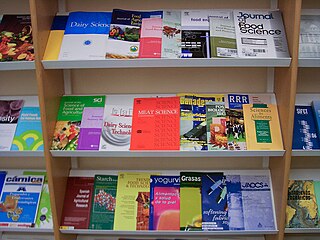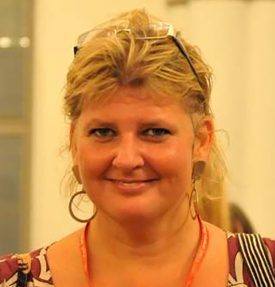
PLOS is a nonprofit publisher of open-access journals in science, technology, and medicine and other scientific literature, under an open-content license. It was founded in 2000 and launched its first journal, PLOS Biology, in October 2003.

In academic publishing, a preprint is a version of a scholarly or scientific paper that precedes formal peer review and publication in a peer-reviewed scholarly or scientific journal. The preprint may be available, often as a non-typeset version available free, before or after a paper is published in a journal.

Academic publishing is the subfield of publishing which distributes academic research and scholarship. Most academic work is published in academic journal articles, books or theses. The part of academic written output that is not formally published but merely printed up or posted on the Internet is often called "grey literature". Most scientific and scholarly journals, and many academic and scholarly books, though not all, are based on some form of peer review or editorial refereeing to qualify texts for publication. Peer review quality and selectivity standards vary greatly from journal to journal, publisher to publisher, and field to field.

An academic journal or scholarly journal is a periodical publication in which scholarship relating to a particular academic discipline is published. Academic journals serve as permanent and transparent forums for the presentation, scrutiny, and discussion of research. They nearly universally require peer review or other scrutiny from contemporaries competent and established in their respective fields. Content typically takes the form of articles presenting original research, review articles, or book reviews. The purpose of an academic journal, according to Henry Oldenburg, is to give researchers a venue to "impart their knowledge to one another, and contribute what they can to the Grand design of improving natural knowledge, and perfecting all Philosophical Arts, and Sciences."
PLOS Biology is a monthly peer-reviewed scientific journal covering all aspects of biology. Publication began on October 13, 2003. It is the first journal published by the Public Library of Science. The editor-in-chief is Nonia Pariente.
BioMed Central (BMC) is a United Kingdom-based, for-profit scientific open access publisher that produces over 250 scientific journals. All its journals are published online only. BioMed Central describes itself as the first and largest open access science publisher. It was founded in 2000 and has been owned by Springer, now Springer Nature, since 2008.
PubMed is a free search engine accessing primarily the MEDLINE database of references and abstracts on life sciences and biomedical topics. The United States National Library of Medicine (NLM) at the National Institutes of Health maintain the database as part of the Entrez system of information retrieval.
PubMed Central (PMC) is a free digital repository that archives open access full-text scholarly articles that have been published in biomedical and life sciences journals. As one of the major research databases developed by the National Center for Biotechnology Information (NCBI), PubMed Central is more than a document repository. Submissions to PMC are indexed and formatted for enhanced metadata, medical ontology, and unique identifiers which enrich the XML structured data for each article. Content within PMC can be linked to other NCBI databases and accessed via Entrez search and retrieval systems, further enhancing the public's ability to discover, read and build upon its biomedical knowledge.

PLOS One is a peer-reviewed open access mega journal published by the Public Library of Science (PLOS) since 2006. The journal covers primary research from any discipline within science and medicine. The Public Library of Science began in 2000 with an online petition initiative by Nobel Prize winner Harold Varmus, formerly director of the National Institutes of Health and at that time director of Memorial Sloan–Kettering Cancer Center; Patrick O. Brown, a biochemist at Stanford University; and Michael Eisen, a computational biologist at the University of California, Berkeley, and the Lawrence Berkeley National Laboratory.
Open peer review is the various possible modifications of the traditional scholarly peer review process. The three most common modifications to which the term is applied are:
- Open identities: Authors and reviewers are aware of each other's identity.
- Open reports: Review reports are published alongside the relevant article.
- Open participation: The wider community are able to contribute to the review process.
PLOS Neglected Tropical Diseases is a peer-reviewed open access scientific journal devoted to the study of neglected tropical diseases, including helminth, bacterial, viral, protozoan, and fungal infections endemic to tropical regions. PLOS Neglected Tropical Diseases is abstracted and indexed in PubMed and the Web of Science. It is the seventh and youngest member of the Public Library of Science family of open access journals.
PubMed Central Canada was a Canadian national digital repository of peer-reviewed health and life sciences literature. It operated from 2010 to 2018. It joined Europe PubMed Central as a member of the PubMed Central International network. PMC Canada was a partnership between the Canadian Institutes of Health Research (CIHR), the Canada Institute for Scientific and Technical Information, and the United States National Library of Medicine (NLM).

OMICS Publishing Group is a predatory publisher of open access academic journals. It started publishing its first journal in 2008. By 2015, it claimed over 700 journals, although about half of them were defunct. Its subsidiaries and brands include Allied Academies, Conference Series LLC LTD, EuroSciCon LTD, Hilaris Publishing, iMedPub LTD, Longdom Publishing SL, Meetings International, Pulsus Group, Research & Reviews, SciTechnol, Trade Science Inc.
Frontiers Media SA is a publisher of peer-reviewed, open access, scientific journals currently active in science, technology, and medicine. It was founded in 2007 by Kamila and Henry Markram. Frontiers is based in Lausanne, Switzerland, with other offices in London, Madrid, Seattle and Brussels. In 2022, Frontiers employed more than 1,400 people, across 14 countries. All Frontiers journals are published under a Creative Commons Attribution License.

PeerJ is an open access peer-reviewed scientific mega journal covering research in the biological and medical sciences. It is published by a company of the same name that was co-founded by CEO Jason Hoyt and publisher Peter Binfield, with initial financial backing of US$950,000 from O'Reilly Media's O'Reilly AlphaTech Ventures, and later funding from Sage Publishing.

In scholarly and scientific publishing, altmetrics are non-traditional bibliometrics proposed as an alternative or complement to more traditional citation impact metrics, such as impact factor and h-index. The term altmetrics was proposed in 2010, as a generalization of article level metrics, and has its roots in the #altmetrics hashtag. Although altmetrics are often thought of as metrics about articles, they can be applied to people, journals, books, data sets, presentations, videos, source code repositories, web pages, etc.
The NIH Public Access Policy is an open access mandate, drafted in 2004 and mandated in 2008, requiring that research papers describing research funded by the National Institutes of Health must be available to the public free through PubMed Central within 12 months of publication. PubMed Central is the self-archiving repository in which authors or their publishers deposit their publications. Copyright is retained by the usual holders, but authors may submit papers with one of the Creative Commons licenses.

Hilda Bastian is a health consumer advocate. Starting in Australia in the 1980s and 1990s and moving to Europe and the USA, she is involved in evidence-based medicine and communicating medical science to the public.

The idea and practise of providing free online access to journal articles began at least a decade before the term "open access" was formally coined. Computer scientists had been self-archiving in anonymous ftp archives since the 1970s and physicists had been self-archiving in arXiv since the 1990s. The Subversive Proposal to generalize the practice was posted in 1994.










